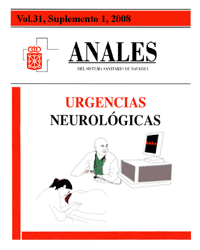Urgencias neurológicas y guardias de Neurología
Palabras clave:
Guardias de Neurología, Urgencias neurológicas, Calidad asistencialResumen
En los últimos años distintos estudios han puesto de manifiesto un progresivo incremento en la demanda de atención neurológica en los servicios de urgencia. Para analizar la conveniencia de las guardias específicas de neurología o del papel que debe desempeñar el neurólogo en los servicios de urgencia, es preciso plantearse cuestiones como: ¿cuál es la demanda de atención neurológica urgente?, ¿cuáles son las urgencias neurológicas más frecuentes?, ¿quién debe atender las urgencias neurológicas y por qué?, ¿son necesarias las guardias específicas de neurología? Las urgencias neurológicas se sitúan entre el 2,6% y el 14% de las urgencias médicas. Los ictus representan la tercera parte de todas las urgencias neurológicas, mientras que los diagnósticos de enfermedad cerebrovascular aguda, epilepsia y cefalea constituyen el 50% de toda la atención neurológica en los servicios de urgencias. En base a criterios de calidad asistencial y de competencia profesional, la mejor atención del paciente con una urgencia neurológica la proporciona el especialista en neurología. La implantación de guardias específicas de neurología de presencia física durante 24 horas se asocia a una mayor calidad asistencial, mejora la orientación diagnóstica y terapéutica desde que el paciente llega a urgencias, reduce ingresos innecesarios, disminuye el coste de la asistencia neurológica, y potencia el servicio de Neurología.Descargas
Descargas
Publicado
Cómo citar
Número
Sección
Licencia
La revista Anales del Sistema Sanitario de Navarra es publicada por el Departamento de Salud del Gobierno de Navarra (España), quien conserva los derechos patrimoniales (copyright ) sobre el artículo publicado y favorece y permite la difusión del mismo bajo licencia Creative Commons Reconocimiento-CompartirIgual 4.0 Internacional (CC BY-SA 4.0). Esta licencia permite copiar, usar, difundir, transmitir y exponer públicamente el artículo, siempre que siempre que se cite la autoría y la publicación inicial en Anales del Sistema Sanitario de Navarra, y se distinga la existencia de esta licencia de uso.








